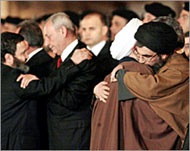New twist in missing Shia cleric case
The family of Lebanon’s missing top Shia Muslim cleric have said Libyan leader Muammar al-Qadhafi offered financial compensation over the cleric’s 1978 disappearance on a visit to Libya, but the relatives rejected the money.

Al-Qadhafi failed to show up in for a hearing in Beirut on Wednesday, ignoring – to no one’s surprise – a summons for questioning in the August 1978 disappearance of Imam Musa al-Sadr and two companions.
Al-Qadhafi’s absence could make him a wanted man in Lebanon if the government pursues the criminal suit raised by al-Sadr’s family.
The legal case and the reported compensation offer are the latest twists in a mystery that has for more than a quarter century angered Lebanon’s 1.2 million Shia community and has strained ties between the two countries.
In Libyan prison?
Lebanese Shia political and religious leaders have blamed al-Qadhafi for the disappearance of al-Sadr and his companions. Despite a widely held belief in Lebanon that they were killed after a dispute with the Libyan leader, the al-Sadr family strongly believes the imam remains in a Libyan jail.
Libya insists al-Sadr and his two aides left its territory on a flight to Rome at the end of their visit, and suggests he was a victim of an inter-Shia power struggle. Their passports reportedly surfaced in Rome during a forgery and impersonation trial late last year and were sent to Lebanon.
 |
|
Al-Qadhafi was summoned to |
Al-Qadhafi offered financial compensation to the family last summer in an attempt to close the case, but the family refused, according to Sadr al-Din al-Sadr, the 50-year-old eldest son of the missing cleric.
No figure was mentioned, the family said.
The reported financial offer may be part of the Libyan leader’s attempts to open a new page as he has since 2003 when he reconciled with the West, accepting responsibility and agreeing to pay $2.7 billion in compensation for the families killed in the 1988 bombing of a PanAm airliner over Lockerbie, Scotland.
There was no immediate Libyan comment on the court case or the family’s claim that al-Gadhafi had offered financial compensation.
Al-Qadhafi summoned
After the al-Sadr family filed a lawsuit in Lebanese court, Lebanon’s prosecutor-general’s office last year ordered that al-Qadhafi and other senior Libyan officials be summoned for questioning about al-Sadr’s disappearance.
Lebanese diplomatic sources said the Foreign Ministry informed Libya of the lawsuit.
|
“Qadhafi is a man wanted by Lebanese law” Al-Sadr family lawyer Chibli Mallat |
But neither al-Qadhafi nor any of the other accused Libyans showed up for a hearing Wednesday.
“Muammar al-Qadhafi and the other accused refused to attend today’s session. This rejection constitutes an additional proof confirming their penal responsibility,” Sadr al-Din al-Sadr told The Associated Press after the hearing.
He said the families of al-Sadr and his companions are now demanding that al-Qadhafi and the other accused be tried before Lebanon’s highest court.
Wanted man
Before Wednesday’s hearing, al-Sadr family lawyer Chibli Mallat had said that if the accused did not show up, the trial would proceed in absentia and “the case will be treated as one of a fugitive from justice. Qadhafi is a man wanted by Lebanese law”.
 |
|
The investigation is a priority for |
The investigating judge, Suhail Abd al-Samad, made no statement after Wednesday’s hearing. The questioning aimed at determining whether to pursue charges against the Libyans, and it was not immediately clear if the process would continue.
The judge could ask for another summons and could seek Interpol’s help in serving it.
Lebanon has no jurisdiction or power to enforce its decisions in Libya. But its issuing of a summons shows the importance that Lebanon is attaching to its investigation – and its willingness to see ties worsen over the case.
Strained relations
The al-Sadr disappearance has long strained relations between Libya and Lebanon. After Libya’s ambassador to Beirut was sidelined in recent years, Libya responded by closing its embassy in 2003 – although it did not break diplomatic ties.
|
“We will not accept a cover up in the case of the country’s imam” Parliament Speaker Nabih Biri |
Mallat said earlier that the Libyan offer of money – which was not the first – was made through “Lebanese and Arab mediators well-connected in Libya” who came to Beirut and contacted the al-Sadr family indirectly “suggesting to them that al-Qadhafi would like to solve this problem once and for all”.
Mallat said the Libyan offer was rejected outright by the al-Sadr family.
“The al-Sadr family wants the truth in this issue before anything else and the release of Imam al-Sadr and his two companions. Also, full responsibility must be established and all those who participated in the disappearance of the imam tried,” Mallat and the cleric’s son said in a joint statement to AP.
Money feud?
Many in Lebanon believe al-Qadhafi ordered al-Sadr and his aides – Shaikh Muhammad Yaqub and journalist Abbas Badr al-Din – killed after a feud over money stemming from the Libyan leader’s funding of militias during Lebanon’s 1975-90 civil war.
The Libyan government, in an 30 August statement issued by the Foreign Ministry, insisted the disappearance was part of a “chain of acts of kidnapping, assassinations and settling of accounts among (Shia) parties struggling over political, religious and ideological issues in the 1970s”.
Lebanon’s highest Shia religious authority, the Supreme Shia Muslim Council, which was founded by al-Sadr, and top Shia leaders – including Parliament Speaker Nabih Biri and Hizb Allah leader Hasan Nasr Allah – have repeatedly urged Qadhafi to disclose al-Sadr’s fate.
Biri told a rally commemorating al-Sadr’s disappearance: “Some may accept to keep silent in exchange for a fistful of dollars. We will not accept a cover-up in the case of the country’s imam.”